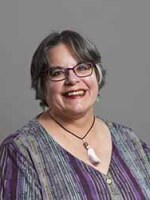The March On Washington Film Festival presents the free virtual event "A Celebration of Hazel Scott: Activism through Music and Art" on Thursday, Feb. 24.
In a career that spanned over four decades, Hazel Scott captivated audiences worldwide with her swing renditions of the classics.
Scott was one of the first performers to refuse to play before segregated audiences, and she included that stipulation in all of her performance contracts.
Born in Trinidad and raised in Harlem, Scott used her influence to improve the representation of African Americans in the arts.
Scott appeared in Broadway shows, and then attempted a Hollywood career. When she refused the demeaning roles that the movie studios offered her, and insisted on the same pay as her white counterparts, Hollywood was done with her.
Returning to New York City, Scott was the focus of media attention for her relationship with preacher and politician Adam Clayton Powell, who became the first African American elected to Congress from New York. They married in 1945.
In 1950, Scott became the first African American woman to host her own television show. The 15-minute, three-times-per-week program featured Scott playing classics, jazz and boogie-woogie piano. The show was very popular, but ended after a few months when Scott was unjustly accused of being a "Communist sympathizer." Her show was canceled one week after she testified before the House Un-American Activities Committee.
After her marriage ended, Scott moved to France. Her home in Paris became a gathering place for the expatriate Black artists and musicians there. Scott returned to the U.S. in 1967, and died from pancreatic cancer in1981.
On Feb. 24, "A Celebration of Hazel Scott: Activism through Music and Art" will include a special screening of "Apollo Live Wire – Hazel Scott," produced by the world-famous Apollo Theater. The film features narration by Scott biographer Karen Chilton, with performances by pianist Damien Sneed and saxophonist and vocalist Camille Thurman.







